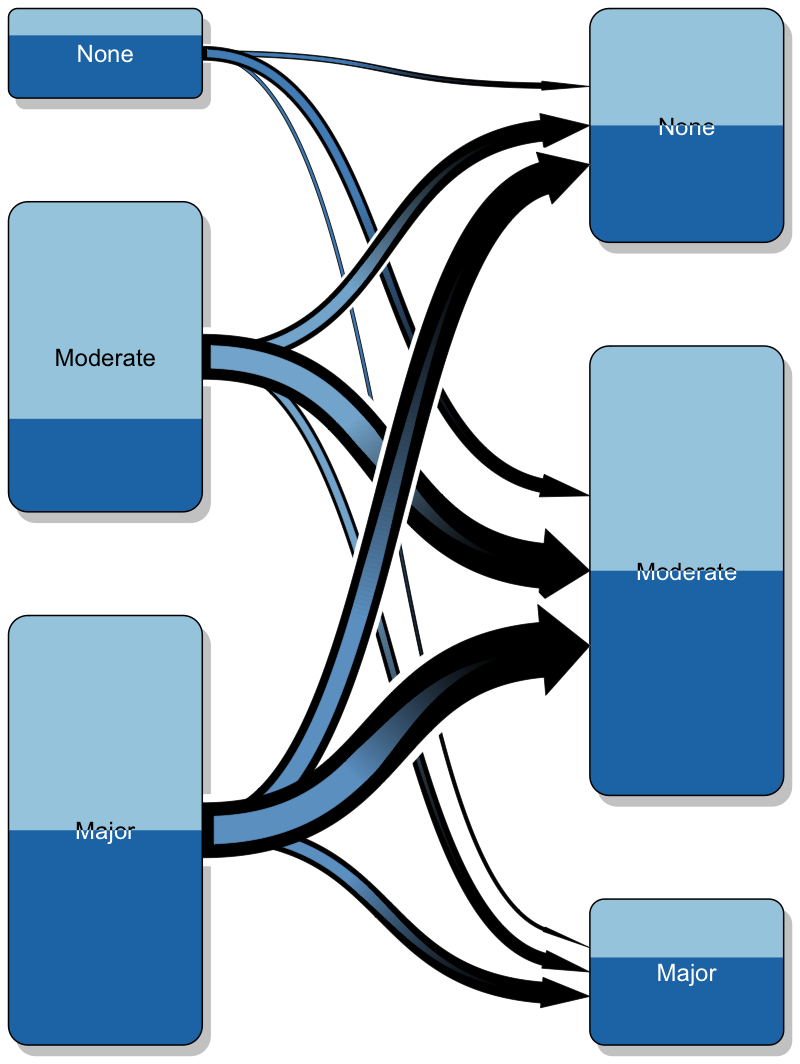Using SVG graphics in blog posts
My traditional work flow for embedding R graphics into a blog post has been via a PNG files that I upload online. However, when I created a 'simple' graphic with only basic curves and triangles for a recent post, I noticed that the PNG output didn't look as crisp as I expected it to be. So, eventually I used a SVG (scalable vector graphic) instead.Creating a SVG file with R could't be easier; e.g. use the
svg() function in the same way as png(). Next, make the file available online and embed it into your page. There are many ways to do this, in the example here I placed the file into a public GitHub repository.To embed the figure into my page I could use either the traditional
<img> tag, or perhaps better the <object> tag. Paul Murrell provides further details on his blog.With
<object> my code looks like this:<object data="https://rawgithub.com/mages/diesunddas/master/Blog/transitionPlot.svg" type="image/svg+xml" width="400"> </object>There is a little trick required to display a graphic file hosted on GitHub.
By default, when I look for the raw URL, GitHub will provide an address starting with
https://raw.githubusercontent.com/..., which needs to be replaced with https://rawgithub.com/....Ok, let's look at the output. As a nice example plot I use a
transitionPlot by Max Gordon, something I wanted to do for a long time.SVG output
PNG output

Conclusions
The SVG output is nice and crisp! Zoom in and the quality will not change. The PNG graphic on the other hand appears a little blurry on my screen and even the colours look washed out. Of course, the PNG output could be improved by fiddling with the parameters. But, after all it is a raster graphic.Yet, I don't think that SVG is always a good answer. The file size of an SVG file can grow quite quickly, if there are many points to be plotted. As an example check the difference in file size for two identical plots with 10,000 points.
x <- rnorm(10000)
png()
plot(x)
dev.off()
file.size("Rplot001.png")/1000
# [1] 118.071
svg()
plot(x)
dev.off()
file.size("Rplot001.svg")/1000
# [1] 3099.181
Update 10 Feb 2016
Or, is SVG the answer? Kenton pointed me towards the svglite package.library(svglite)
svglite(file = "Rplot001.svg")
plot(x)
dev.off()
file.size("Rplot001.svg")/1000
# [1] 973.619
gz <- function(in_path, out_path = tempfile()) {
out <- gzfile(out_path, "w")
writeLines(readLines(in_path), out)
close(out)
invisible(out_path)
}
file.size(gz("Rplot001.svg", "Rplot001.svgz")) / 1000
#> [1] 74.11R code
Session Info
R version 3.2.3 (2015-12-10)
Platform: x86_64-apple-darwin13.4.0 (64-bit)
Running under: OS X 10.11.3 (El Capitan)
locale:
[1] en_GB.UTF-8/en_GB.UTF-8/en_GB.UTF-8/C/en_GB.UTF-8/en_GB.UTF-8
attached base packages:
[1] grid stats graphics grDevices utils datasets
[7] methods base
other attached packages:
[1] RColorBrewer_1.1-2 Gmisc_1.3 htmlTable_1.5
[4] Rcpp_0.12.3
loaded via a namespace (and not attached):
[1] Formula_1.2-1 knitr_1.12.3
[3] cluster_2.0.3 magrittr_1.5
[5] splines_3.2.3 munsell_0.4.2
[7] colorspace_1.2-6 lattice_0.20-33
[9] stringr_1.0.0 plyr_1.8.3
[11] tools_3.2.3 nnet_7.3-12
[13] gtable_0.1.2 latticeExtra_0.6-26
[15] htmltools_0.3 digest_0.6.9
[17] forestplot_1.4 survival_2.38-3
[19] abind_1.4-3 gridExtra_2.0.0
[21] ggplot2_2.0.0 acepack_1.3-3.3
[23] rsconnect_0.3.79 rpart_4.1-10
[25] rmarkdown_0.9.2 stringi_1.0-1
[27] scales_0.3.0 Hmisc_3.17-1
[29] XML_3.98-1.3 foreign_0.8-66







No comments :
Post a Comment